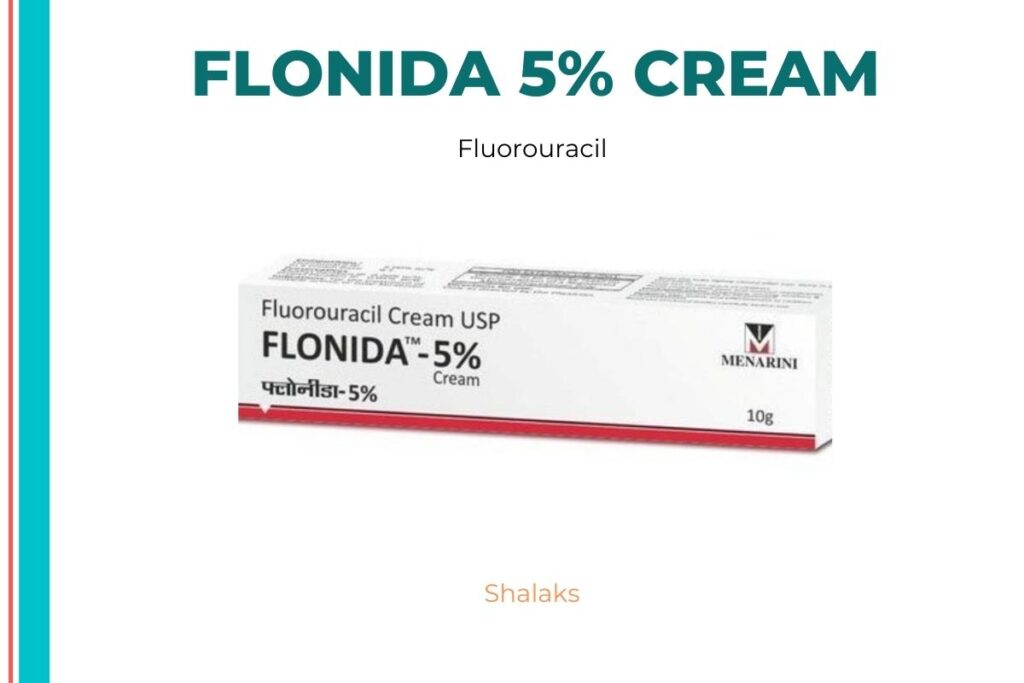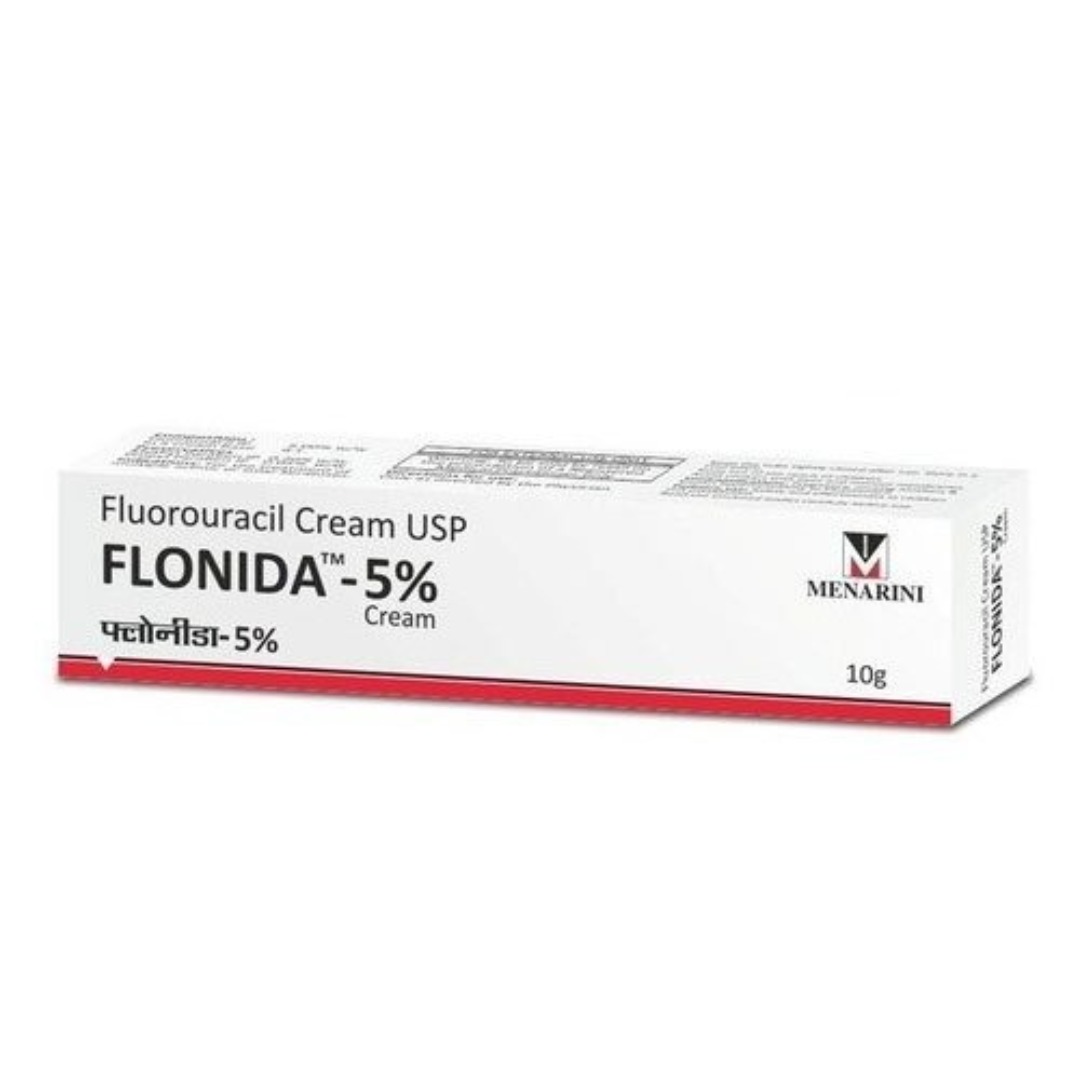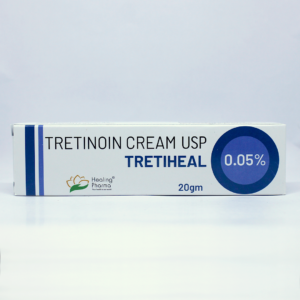Flonida 5 percent Cream 10 Gram
Flonida 5 percent Cream 10 gm belongs to a class of anti-cancer drugs known as ‘antimetabolites,’ which are used to treat cancers of the breast, skin, colon, rectum, and stomach. Cancer is a disease in which aberrant cells multiply uncontrollably and cause tissue destruction. Some of the body’s cells begin to divide uncontrollably into all cancer forms and spread throughout the body’s tissues. Cancer can be isolated (benign) or spread throughout the body (malignant) (metastasized).
Flonida 5 percent Cream 10 gm contains ‘Fluorouracil,’ which inhibits the growth of cancer cells’ genetic material (DNA and RNA). This stops cancer cells from proliferating and expanding, ultimately killing them. Colon cancer, oesophageal (food pipe) cancer, stomach cancer, pancreatic cancer, breast cancer, and cervical cancer are all treated with Flonida 5 percent Cream 10 gm.
Take 10 gm of Flonida 5 percent Cream as directed by your doctor. Depending on your medical conditions, you should take Flonida 5 percent Cream 10 gm for as long as your doctor has given it. Nausea, vomiting, fatigue, loss of appetite, increased infection risk, hair loss, diarrhoea, decreased blood cells (red cells, white cells, and platelets), mouth ulcers, and blisters on fingers and feet are all possible side effects. The skin lesions and surrounding areas will feel irritating and seem red, puffy, and scaly during the first several weeks of treatment. This indicates that Flonida 5 percent Cream 10 gram (cream) is doing its job. The majority of these Flonida 5 percent Cream 10 gm side effects do not require medical care and will go away with time. However, if the negative effects do not go away, consult your doctor.
Continue to use Flonida 5 percent Cream 10 gm as directed by your doctor to effectively treat your disease. Do not stop using Flonida 5 percent Cream 10 gm in the middle of the treatment. If you have allergies, a metabolic issue called DPD (dihydropyrimidine dehydrogenase) deficiency, cardiac difficulties, one marrow depression, kidney disease, liver disease, or treatment with chemotherapy or radiation, consult your doctor before using Flonida 5 percent Cream 10 gm. If you’re pregnant or breastfeeding, you should avoid using Flonida 5 percent Cream 10 gm because it can harm your unborn child. To avoid conception, both women and men who use this Flonida 5 percent Cream 10 gm should utilize birth control.

Flonida 5 percent Cream 10 gm uses
Breast cancer, stomach cancer, colon cancer, and skin cancer are all types of cancer.
Medicinal Advantages
Flonida 5 percent Cream 10 gm belongs to the antimetabolite class of anti-cancer drugs. It’s used to treat colon, rectum, breast, stomach, pancreatic, and ovarian cancers. It’s also used to treat actinic or solar keratoses (scaly or crusted lesions (skin region) produced by years of too much sun exposure) and superficial basal cell carcinoma, a type of skin cancer. Treatment of cervical, bladder, hepatic, prostate, endometrial, and head and neck carcinomas are among the other uses for Flonida 5 percent Cream 10 gm. Fluorouracil, which is found in Flonida 5 percent Cream 10 gm, operates by interfering with the growth of cancer cells’ genetic material (DNA and RNA). This stops cancer cells from proliferating and expanding, ultimately killing them.
Use Instructions
Injection and topical (skin usage) cream versions of Flonida 5 percent Cream 10 gm are available.
A healthcare expert will deliver the Flonida 5 percent Cream 10 gm injection. Flonida 5 percent Cream 10 gm should not be self-administered. Your doctor will determine how long you need to take Flonida 5 percent Cream 10 gm based on your medical situation. Cream: The injured region should be cleaned and dried. Apply a thin layer of medication to the affected area after that. Hands should be washed before and after use. Follow your doctor’s instructions for taking the medication. Do not exceed the suggested dose or discontinue taking the drug without consulting your doctor. Do not apply to open wounds or broken skin. This drug should not be used in the eyes. If the medication goes into your eyes by accident, rinse them well with water.
Store in a cool, dry location away from direct sunlight.
Flonida 5 percent Cream 10 gm Side Effects
Nausea
Vomiting \sWeakness
Appetite loss.
Infection risk is higher.
Hair loss is a common problem.
Diarrhoea
Reduced blood cell count
Ulcer in the mouth
Blisters on the fingers and toes
Drug Recommendations
If you have an infection, tell your doctor before taking Fluorouracil since Fluorouracil can make it worse. Talk to your doctor if you have any allergy symptoms, a metabolic illness called DPD (dihydropyrimidine dehydrogenase) deficiency, cardiac difficulties, bone marrow depression, kidney disease, liver disease, or chemotherapy or radiation treatment. Because some people may be sensitive to light when taking Fluorouracil, it is best to avoid prolonged sun exposure. If you’re pregnant, talk to your doctor about Fluorouracil because it can harm an unborn child. To avoid pregnancy, both women and men who use Fluorouracil should utilize birth control. Congenital problems may develop from either parent’s use of this Fluorouracil. Fluorouracil should not be taken while breastfeeding; if you are using Fluorouracil, tell your doctor. Fluorouracil should be used with caution in older people. Do not take live vaccines 3 months after your last chemotherapy if you have had leukemia (blood cancer) and are in remission. The polio vaccine should not be given to you or anybody in your immediate circle, such as family members. Fluorouracil (cream) should not be used on open wounds, damaged, or broken skin. Unless recommended by a doctor, do not wrap or cover the treated area with airtight dressings. Because the fabric (bedding, clothing, and dressings) in touch with Fluorouracil rapidly catches fire and burns, avoid smoking or going near naked flames. Product build-up can be reduced but not completely removed by washing garments and bedding.
Interactions Between Drugs
Fluorouracil interacts with other anti-cancer medicines (methotrexate, cisplatin, cytarabine, mitomycin-C, tamoxifen), antibiotics (metronidazole), medicines to reduce the harmful effects of anti-cancer medicines (calcium leucovorin), a gout medicine (allopurinol), a stomach ulcer medicine (cimetidine), blood thinner (warfarin), antivirals ( (rubella, mumps, measles, BCG, shingles).
Food-Drug Interactions: No food-drug interactions have been discovered.
Patients with myelosuppression (decreased bone marrow activity), dihydropyrimidine dehydrogenase (DPD) enzyme deficiency, stomatitis, infections, bleeding disorders, and coronary artery disease should not use fluorouracil.
Safety Suggestions
ALCOHOL
To minimize undesirable side effects, you should avoid drinking alcohol while taking Fluorouracil. Increased sleepiness may occur if you drink alcohol while taking Fluorouracil.
PREGNANCY
Because it harms the fetus, fluorouracil should not be used during pregnancy (newborn baby). While taking fluorouracil and for at least 6 months later, both women and men of reproductive potential must use an effective method of contraception. If you have any concerns, please visit your doctor.
BREAST FEEDING
Fluorouracil should not be taken when breastfeeding because it gets into the breastmilk and could harm the baby. It is not recommended for mothers who are breastfeeding.
DRIVING
Fluorouracil may produce dizziness and sleepiness; if you feel dizzy, do not drive or operate heavy machinery.
LIVER
Please with your doctor before using Fluorouracil if you have a history or indications of liver disease.
Before prescribing it to you, your doctor will consider the advantages as well as any potential hazards.
KIDNEY
Please see your doctor before using Fluorouracil if you have a history or indications of kidney disease.
Before prescribing it to you, your doctor will consider the advantages as well as any potential hazards.
No habit formation
Advice on Diet and Lifestyle
To maintain a healthy weight, eat a nutritious food and exercise on a regular basis.
Avoid smoking and consuming alcoholic beverages.
Leafy greens, citrus fruits, fatty fish, berries, yogurt, apples, peaches, cauliflower, cabbage, broccoli, beans, and herbs should all be included in your diet.
Fast food, fried foods, processed meats, refined carbohydrates, and added sugars should all be avoided.
Rest well and get a good night’s sleep.
Recommendations
Routine blood tests may be ordered by your doctor to evaluate your liver function, electrolyte levels, and blood cell count.
Wear protective clothing, sunglasses, and sunscreen to avoid unnecessary or prolonged exposure to sunlight and UV rays (such as tanning booths). Fluorouracil can make your skin photosensitive.
Fluorouracil should only be used under the direction of a doctor. While using Flonida 5 percent Cream 10 gm, your doctor will monitor your condition on a regular basis.
If you see any signs of illness, such as fever, diarrhea, or chills, see a doctor right once.
Additional Information: This item is non-refundable.
Concerns of Patients
Breast cancer is a form of cancer that arises in breast cells after being triggered by oestrogen, a female sex hormone. Breast cancer can develop in the lobules (milk-producing glands), ducts (the channel that transports milk from glands to the nipple), fatty tissue, or fibrous connective tissue of the breast. Tumor cells infiltrate healthy breast cells and go to lymph nodes, which serve as a key channel for cancer cells to spread throughout the body. A lump in the breast or tissue thickening that feels different than the typical surrounding tissues, breast pain, redness, swelling, and nipple discharge other than breast milk are all signs of breast cancer.
Stomach cancer (gastric cancer) is a form of cancer that arises from the lining of the stomach. Smoking, a high-processed or salty-food diet, and a severe H. pylori bacterial infection are all risk factors. Feeling bloated after eating, feeling full after eating tiny amounts of food, nausea, heartburn, or indigestion are all symptoms of stomach cancer.
Skin cancer is defined as abnormal cell proliferation on the surface of the skin. UV light exposure causes skin cancer, which is much more likely in people who are darkly pigmented. The majority of skin malignancies are caused by DNA mutations in epidermal cells caused by UV radiation.
FAQs
Fluorouracil is a drug that is used to treat cancer. Fluorouracil is an anti-cancer drug that acts by inhibiting the proliferation of cancer cells’ genetic material (DNA and RNA). Cancer cells’ growth is slowed, and they finally die as a result.
Take the Fluorouracil as soon as possible, but skip the missed dose if your next dose is approaching. Do not combine two dosages at once. Before you run out of Fluorouracil, get your prescription refilled.
Yes, fluorouracil often affects hair by making it thin, which leads to hair loss. It is, however, a rare occurrence. Hair loss may occur as a result of Fluorouracil’s estrogen-lowering action. These effects are temporary and may reappear after some time. If it’s important to you, talk to your doctor about it.
Fluorouracil has the potential to alter the findings of blood tests and other laboratory testing. Tell the person performing the tests that you’re taking 10 gm of Flonida 5 percent Cream.
Fluorouracil may impact both men and women’s fertility (ability to have children). Following Fluorouracil treatment, you may be unable to conceive or father a child. However, if you think you might wish to have a kid in the future, talk to your doctor before commencing Fluorouracil medication.
The drug fluorouracil (cream) can make your skin more sensitive to the sun’s damaging rays. As a result, when using Fluorouracil, it is recommended that you wear protective clothing. Sunlamps and tanning salons are not suggested.
Due to the loss of estrogen in the body, fluorouracil may cause osteoporosis (bone weakening). Osteoporosis can be monitored with regular bone density testing. If you see any signs of tendon discomfort or swelling while using Flonida 5 percent Cream 10 gm, contact your doctor.
Depending on the type and stage of cancer being treated, your doctor will determine the number of treatment cycles and the frequency with which Fluorouracil should be taken.








Leave a Reply
You must be logged in to post a comment.